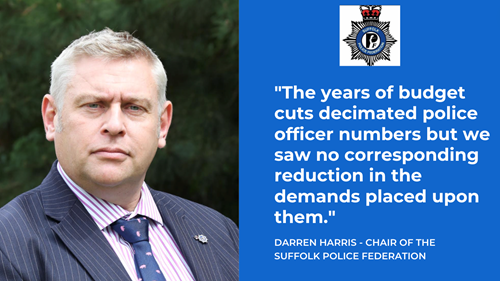Suffolk police officers’ morale is low, survey reveals
10 April 2024
Four out of five Suffolk Police Federation members have said they had experienced feelings of stress, low mood, anxiety or other difficulties with their health and wellbeing over the last 12 months, according to the findings of a nationwide pay and morale survey.
The survey, which is conducted annually by the Police Federation of England and Wales, also revealed 93 per cent of respondents from Suffolk Constabulary felt that morale within the Force is currently ‘low’ or ‘very low’.
In addition, 58 per cent of Suffolk Police Federation members said their morale is currently ‘low’ or ‘very low’, the fifth highest percentage of the 43 forces across England and Wales sitting behind the Metropolitan Police and the West Mercia, Norfolk and North Yorkshire forces.
“I am not at all surprised by the figures revealed in this survey,” says Darren Harris, chair of Suffolk Police Federation. “Police officers are under huge pressure. In Suffolk this has been compounded throughout autumn and winter 2023, and into spring this year, by the inability of the Constabulary to be able to resource football matches without cancelling our members' rest days and putting in place annual leave bans on match days.
“When many of our members get very few weekend days off anyway, this has, and continues to have, a huge impact on their morale. On top of this, we have seen years of budget cuts which have decimated police officer numbers but we saw no corresponding reduction in the demands placed upon them.

“In fact, I think police officers are expected to do more and more, as the service of first and last resort, they were expected to fill in the gaps left by other under-funded organisations. At the same, they suffered real-term pay cuts and their wages have still not caught up.
“The Police Uplift Programme has increased police numbers but officers do not feel valued by the Government and constant negative headlines in the media do nothing to help.
“We need the Government to get behind policing, starting with restoring a fair and truly independent pay review process, and committing to sustained investment that will allow police leaders to make long-term plans for providing a high-quality service for the communities we serve.”
The survey, which ran for five weeks from the start of November last year, also revealed:
-
95 per cent of respondents from Suffolk Constabulary said that they do not feel respected by the Government
-
86 per cent said that they have ‘never’ or ‘rarely’ been able to take an 11-hour break between shifts in the last 12 months
-
80 per cent did not feel valued within the police
-
76 per cent would not recommend joining the police to others
-
73 per cent were ‘dissatisfied’ or ‘very dissatisfied’ with their overall remuneration, including basic pay and allowances
-
64 per cent said that over the previous 12 months, their workload has been ‘too high’ or ‘much too high’.
-
50 per cent said that they find their job ‘very’ or ‘extremely’ stressful
-
16 per cent had suffered one or more injuries that required medical attention as a result of work-related violence in the last year.
-
Only 11 per cent of respondents from Suffolk Constabulary reported having access to double crewing.
The Federation survey, which has been carried out annually since 2014, obtains members’ views on their pay and conditions, as well as their attitudes to their work and the police service in general. It is one of the largest annual surveys of police officers conducted within England and Wales.
The survey also assesses officers’ reasons for low morale. This year 99 per cent of Suffolk officers blamed the way the Government treats officers. The other reasons they cited included how the police are treated by the public (94 per cent), workload and responsibilities (69 per cent), pension (65 per cent) and work-life balance (62 per cent).
The Suffolk results also showed that 88 per cent of officers felt they were worse off than five years ago, which was the fourth highest percentage of all forces.
A total of 92 per cent of Suffolk officers felt they were not paid fairly for the stresses and the strains of their job, while 82 per cent said they were not fairly paid for the hazards they faced.
“This survey shines a spotlight on the realities of being a police officer,” says Darren, “Policing has always been a challenging job, and everyone goes into a career as a police officer knowing that.
“But what is making it even more challenging in the current day and age is the fact that police officers no longer feel they are treated fairly by the Government, nor that they are paid a wage that recognises their role, nor that they respected or valued by politicians or the public.
“I fully appreciate that we have a General Election looming but I sincerely hope that whichever party forms the next Government takes the time to read the results of this survey and does everything in its power to improve police pay and officer morale.
“But our first step now is to discuss the findings with chief officers within our own Force and, as a Federation, we will do everything we can to ensure our members’ voices are heard.”
Read the full Suffolk Pay and Morale Survey report.


















